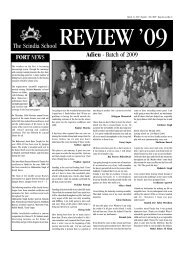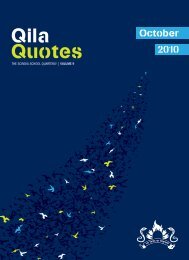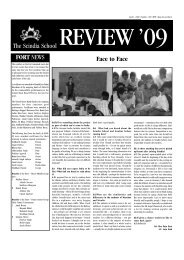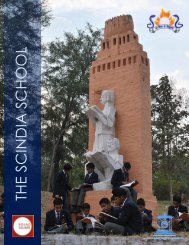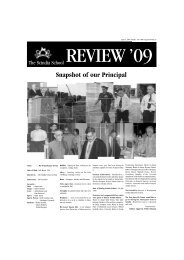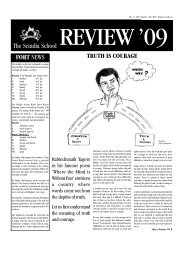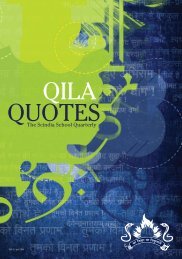31st July 2010 - The Scindia School
31st July 2010 - The Scindia School
31st July 2010 - The Scindia School
Create successful ePaper yourself
Turn your PDF publications into a flip-book with our unique Google optimized e-Paper software.
For<br />
21<br />
VOL 8 | Jul <strong>2010</strong><br />
Earth hour in schools<br />
- mere tokenism<br />
During Earth hour, students spend an enjoyable sixty minutes in the dark, safe in the knowledge<br />
that the life-saving benefits of industrial civilization are just a light switch away. And that feeling is<br />
often mistaken as ‘caring for the mother Earth’. This is what makes the observance of earth hour<br />
in schools, a mere token.<br />
Earth hour in schools is nothing but a futile attempt to ‘Save the planet’. Turning off lights for an<br />
hour is hardly of any consequence. Just think what did we do once the earth hour got over First<br />
of all gave a sigh of relief and then sat under the ‘electrically’ powered fans. This showed that the<br />
effort was worthless.<br />
<strong>The</strong> earth hour, in fact, does more harm than good. During the earth hour ceremony, we pledged<br />
to only make use of candles and torches for that one hour. But, candles are actually even<br />
worse in creating carbon emissions than electric lights. <strong>The</strong>se emissions are what cause global<br />
warming. As for the torch, dead batteries produce carbon emissions and therefore are bad for the<br />
environment and global warming.<br />
I’d like to conclude by saying that when people think they are doing their part for the environment,<br />
they are actually causing more carbon emissions and destroying the ozone layer. And this shows<br />
that technically, the schools participated in the event without knowing its pros and cons.<br />
It is nothing but mere tokenism similar to days like Valentine’s Day, Mother’s day, Father’s day and<br />
so on which are celebrated to express love for our near and dear ones while expressions of love<br />
should be spontaneous and need not be restricted to an hour or a day.<br />
Earth hour in schools is a mere token to our mother earth. It is just like a card from her children<br />
saying that we care. However that card doesn't carry any meaning at all because we play havoc<br />
with the planet on all other days and hours. What difference would one day, one hour make It is<br />
just a facade, a shame, a mockery.<br />
Sidhivinayak Singh<br />
X E<br />
(<strong>The</strong> <strong>School</strong> observed Earth hour on 27th March)<br />
Literary<br />
Section<br />
Against<br />
Let me start by saying, “Let there be no light."<br />
It was exactly 15 minutes past 8 (Indian<br />
standard time) and I was in my hour of<br />
‘voluntary darkness.’ <strong>The</strong> earth hour, was on.<br />
Now some may see the earth hour in schools<br />
as mere tokenism and question its need. But,<br />
to their misplaced cynicism, I have some valid<br />
justifications.<br />
I ask why not have an earth hour I believe that<br />
such tokenism is needed. Think about it, how<br />
many of us get the time every day to tell our<br />
parents how much we love them How many<br />
times do we acknowledge their presence in our<br />
lives At least on father's or mother's day, we<br />
make some gesture to honour their presence.<br />
Yes, token gestures. But wishing them, thanking<br />
them for their contribution and presence in our<br />
life makes the gesture meaningful.<br />
Similarly, we could debate till the cows come<br />
home, but the fact remains that in this one<br />
hour, there would be no power consumption,<br />
no electricity flowing into unwanted<br />
appliances, no wastage. Whether we like it<br />
or not, the truth remains that we realise the<br />
importance of something only when we feel<br />
its absence. Perhaps in that one hour, we<br />
become conscious of the importance of saving<br />
electricity, the importance of no wastage.<br />
Maybe that one hour makes us aware of our<br />
misuse of electricity and we get ready to make<br />
a fresh beginning on a blank slate.<br />
Though we may not have power in our lives for<br />
that one hour, we do gain more inner power as<br />
conscious human beings! Let’s not demean<br />
the importance of that one hour by calling it<br />
mere tokenism as that one hour of voluntary<br />
darkness is indeed a major step towards a<br />
brighter future.<br />
Fort Fables Eco Club<br />
<strong>The</strong> Fort denizens can justifiably boast of<br />
growing up with a rich variety of flora and<br />
fauna all around them. From hornbills to green<br />
pigeons and golden orioles, from porcupines<br />
to the common palm civet and pythons, from<br />
ashwagandha to neem chameli and ashtawar,<br />
you name it and the Fort has it. This quite<br />
naturally sensitises the residents towards the<br />
environment and they are ever so keen to do<br />
their bit for its conservation.<br />
A laudable effort in this direction was the<br />
founding of the Eco Club in the year 2000 by<br />
Mrs. Sujata Aslam. After her Mrs. Raksha Siriah<br />
and then Dr. Jyoti Puri held charge of the same.<br />
Presently Ms. Sangeeta Jain and Dr Geeta<br />
Shukla are guiding the Club and its activities.<br />
Mr Jitendra Jawale who has extensive<br />
knowledge of the rich biodiversity of the Fort<br />
has been of active assistance to all of them.<br />
<strong>The</strong> Club has been creating awareness<br />
amongst the school community about<br />
its immediate environment and global<br />
environmental issues, ever since its inception.<br />
<strong>The</strong> members of the Club are committed and<br />
enthusiastic about their role.<br />
<strong>The</strong> Eco Club has undertaken a number of<br />
activities like motivating the students to keep<br />
their surroundings green and clean by extensive<br />
plantation of trees especially near the mess.<br />
Several clean up drives have also been taken<br />
up to motivate students to adopt a life style<br />
focused on minimum waste generation. <strong>The</strong>y<br />
are taught eco friendly concepts such as<br />
source separation of waste, taking the waste<br />
to the nearest disposal point and recycling.<br />
This has been done in collaboration with<br />
the Community Service and Ladies’ Club.<br />
To encourage people to minimise the use of<br />
plastic bags, paper bags are distributed to<br />
parents on every Founder’s Day.<br />
<strong>The</strong> Club has also been putting up regular<br />
exhibitions for the Founder’s Day from the<br />
year 2000 onwards. Some of them centred<br />
on themes of water, extinct and endangered<br />
species, curtailing use of plastics, herbs found<br />
on the Fort, birds and sustainable development<br />
Activities like essay writing, poster making,<br />
slogan writing competitions, making Power<br />
Point Presentation, posting eco news on notice<br />
boards are undertaken on a regular basis to<br />
keep the message of conservation alive. <strong>The</strong><br />
Club has been instrumental in getting waste<br />
bins placed at all strategic points on the Fort.<br />
T-Shirts with suitable slogans and cards of<br />
handmade paper made by children were put<br />
on sale to generate funds for the Club.<br />
<strong>The</strong> Club also organised visits of eminent<br />
people like Mr. Sunderlal Bahuguna, Mr.<br />
Aniruddha Mukherjeee from the Wildlife Trust<br />
of India, Mr. Rakesh Jaiswal from a Kanpur<br />
based NGO- Eco Friends- and Dr. Singh,<br />
an ornithologist working with the Chambal<br />
Sanctuary, to name a few.<br />
From time to time, students are taken on visits<br />
to nearby places like the Chambal Sanctuary,<br />
Tigra Dam, bird watching and walks around the<br />
Fort. Nature walks have been a regular feature<br />
wherein students have been made aware of the<br />
indigenous flora and fauna. Students are able<br />
to identify more than thirty species of birds<br />
here. <strong>The</strong> various types of trees growing here<br />
have been recorded. Members have also been<br />
given wide-ranging information about different<br />
trees- the nurturing they require, the value of<br />
their parts, the kind (warm\cool) of shade they<br />
provide and so on.<br />
In addition to this commendable work, the<br />
students also participated regularly in the<br />
Green Olympiad (Eco quiz) organized by TERI.<br />
In 2005, five students took part in National<br />
Children’s Science Congress – Harness Water<br />
Resources for a Better Future- and reached the<br />
final stage.<br />
<strong>The</strong> Surajkund Solid Waste Management<br />
Project which was a Pilot project for the<br />
Surajkund area to be replicated in the whole<br />
school was appreciated by Volvo Adventure in<br />
2003 by giving an award. <strong>The</strong> Project aimed at<br />
creating awareness about the 3 R’s –reduce,<br />
reuse and recycle. A power point presentation<br />
for the residents of Suraj Kund, a street play,<br />
a detailed plan for waste disposal, covered<br />
bins in front of the residences, compost pits<br />
behind the residences, a well chalked out<br />
timeline, distribution of dustbins and jute bags<br />
to the residents were some of the activities<br />
undertaken as part of the Project. <strong>The</strong> students-<br />
Vijaylaxmi Pande, Anirbed Baruah, Shreyansh<br />
Divyankar, Vikramaditya Malladeb and<br />
Shubham Madaan- and the teacher guide, Mrs<br />
Sujata Aslam were awarded Certificates. A cash<br />
prize of Rs. 35,000 was given to the school. We<br />
stood second among 27 schools in India.<br />
We are sure that the members of the Club will<br />
continue with their dedicated work and take<br />
the Club from strength to strength leaving a<br />
rich heritage for the future inhabitants of the<br />
Fort.<br />
Mrs. Raksha Siriah and Mrs. Sujata Aslam with the<br />
students during a tree plantation drive<br />
22 Fort<br />
Fables<br />
VOL 8 | Jul <strong>2010</strong>






